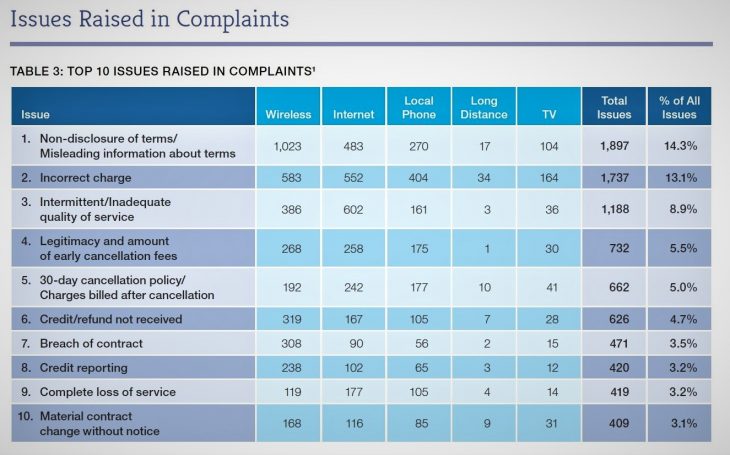
OTTAWA – Complaints to the Commission for Complaints for Telecom-television Services (CCTS) shot up 73% over last year, led by Canadian wireless customers’ grievances over non-disclosure or inaccurate information about their terms of service.
In its mid-year report released Tuesday, CCTS said it accepted 6,849 complaints between August 1, 2017 and January 31, 2017, up by more than 2,800 from the 3,955 complaints that it received in the same period a year earlier.
While CCTS began accepting TV complaints on September 1st, it received only 846 complaints that contained TV issues. Of those, 230 were solely about TV; in the others, TV was complained about, along with another service(s). According to the report, 389 TV complaints were resolved, and no confirmed breaches of the Television Service Provider Code were found.
CCTS noted fewer breaches of the Wireless Code and the Deposit and Disconnection Code by service providers than in the same period last year, which dropped to 43 and 2, respectively, from 52 and 7.
According to the report, non-disclosure or misleading information about contract terms was once again the most commonly raised issue (14.3% of all issues), and first with wireless customers. This was followed by complaints about incorrect charges at 13.1%, which was a top concern of TV and phone customers, while intermittent/inadequate quality of service complaints made up 8.9% of all issues, and was the chief complaint of Internet customers.
Bell continued to top the list of the 114 participating service providers with 2,275 complaints (33.2% of all accepted complaints in the six month period; down 2.5% from last year), followed by Rogers with 707 complaints and 10.3% (which was down 1.5%). Telus held down third spot with 511 complaints and 7.5% (an 0.5% increase), followed by Bell flanker brand Virgin Mobile with 429 complaints and 6.3% (a 0.4% dip) and Vidéotron with 368 complaints (5.4%, a 1.6% increase).
Despite the significant increase in complaints, CCTS resolved over 90% of the complaints concluded in the period. Of those resolved complaints, over 88% were resolved within the first 30 days of being accepted.
“Our work is responsive to events occurring in the telecom and TV marketplace. We did not predict this significant increase in workload”, said CCTS commissioner Howard Maker, in a statement. “As a result, we are experiencing some delays in handling customer complaints at the investigation level of our process. But we are working very hard to increase the available resources in order to return to our expected customer service timelines.”
The CCTS also received a number of complaints about issues that fall outside of its mandate, such as poor customer service and service provider general operating practices and policies (e.g. the contents of plans and packages, the terms of fair use policies, etc.)


